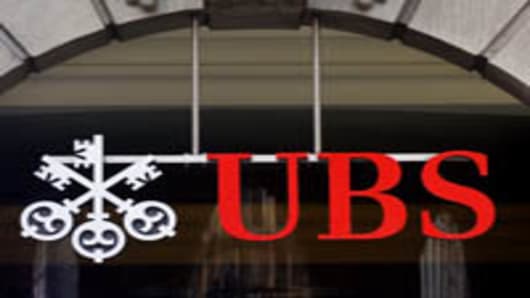UBS doubled its writedowns from the subprime crisis on Tuesday, dumped its chairman and sought more emergency capital in a second attempt to reverse its fortunes.
Its shares climbed over 12 percent as investors hoped the move marked a turning point for the firm that now leads the global list of banks hit hardest by the credit crisis.
UBS wrote down an additional $19 billion in ailing assets, bringing to $37 billion the damage wrought by the subprime crisis and causing a net loss of 12 billion Swiss francs ($12.03 billion) in the first quarter.
It pushes UBS, Switzerland's flagship bank and financial fortress for rich investors, past Merrill Lynch to the top of the league of writedown shame.
UBS said it would seek another 15 billion francs through a fully underwritten rights issue of shares, bringing to 34 billion francs the total of emergency capital sought by UBS, and that it would hive off ailing portions of the bank into a separate unit.
The moves were more dramatic than expected by many. This is UBS's second attempt to put the crisis, born of its breakneck expansion into investment banking, behind it.
Shares in the bank rallied as traders who had bet on even worse news struggled to cover their positions and as investors hoped the moves were enough to put the bank back on track.
"This is probably something of a turning point for UBS," said analyst David Williams at brokerage Fox-Pitt Kelton.
Downfall
The crisis claimed the head of the bank's chairman, Marcel Ospel, widely criticized for letting Switzerland's flagship bank sail blithely into dangerous waters in an ambitious bid to become the world's biggest investment bank.
Ospel, once the don of the secretive Swiss establishment but a figure now widely lampooned, said he formally decided to quit late Monday night as the bank prepared to go to shareholders for a second time in as many months for emergency capital. UBS proposed its lawyer, Peter Kurer, as Ospel's successor.
UBS has already replaced nearly all its top management and watched its share price more than halve since June, when the force of the subprime crisis began to register. (Video: What's next for UBS?)
More job cuts in the group's investment bank -- source of the losses, in sharp contrast to the group's wealth management division -- were on the way, UBS Chief Executive Marcel Rohner said in a conference call with journalists.
"Clearly the industry is in a very difficult environment and we have to review the capacity with which we operate in this environment," he said.
The writedowns more than outweigh the roughly $35 billion in net profit UBS has posted since 2004 and put the group on track to post a second year of losses in 2008 after the group posted its first ever annual loss in 2007.
Deutsche Bank also signaled the depth of the industry's woes on Tuesday, reporting a surprise 2.5 billion euros in writedowns, saying market conditions had deteriorated dramatically in recent weeks.
Workout
UBS said it would create a new division to deal with the ailing assets after its mortgage-related positions deteriorated further in the quarter.
"UBS is aiming to put a line below its risk exposure problem and refocus on operational businesses," said analysts at J.P. Morgan in a note to clients.
The creation of a so-called workout unit, sometimes called a "bad bank," would allow UBS to confine the credit problems to a separate division, permitting management to focus on the group's profitable operations and investors to assign value to them.
The bank needs a sound capital base to underpin its wealth-management business for rich clients, who have less tolerance to losing money than institutional investors and are easily irked by negative headlines.
While the group was able to reduce some of its exposure to ailing debt, other potential risks increased and its overall position in U.S. mortgages had deteriorated further, UBS said.
The writedowns come at the upper end of expectations and on top of $18.4 billion in damage caused by the subprime crisis last year, which forced the bank to ask its shareholders for 19 billion francs in capital in February.
UBS shares have lost 45 percent this year on concerns it would need to raise capital again, making it the European blue chip bank to suffer the most in 2008.
Analysts had expected the bank to write down an additional 10-20 billion francs in 2008.
UBS said the rights issue of new shares was underwritten by a syndicate of banks led by JPMorgan, Morgan Stanley, BNP Paribas and Goldman Sachs.
Singapore state-owned Government of Singapore Investment Corp said it had not yet made a decision on whether to take up its rights. The fund took a 9 percent stake in UBS as part of the earlier emergency capital injection.


